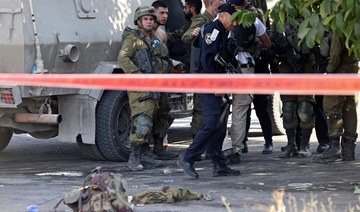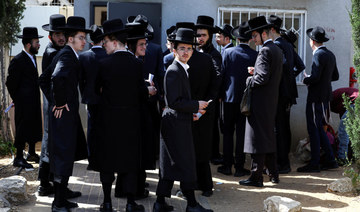LONDON: Foreigners are being ordered by the Israeli Defense Ministry to inform the government if they fall in love with a Palestinian in the West Bank territory amid a range of new immigration rules.
If any foreigner marries a Palestinian, immigration restrictions mean they will need to leave after 27 months and cannot return for at least half a year.
The new rules are expected to become law on Monday, with updated regulations being issued in a document published by the Israeli government.
Regulations include a demand that foreigners inform the Israeli authorities within 30 days of starting a relationship with a Palestinian ID holder.
There are also updated restrictions on Palestinian education, with new quotas on student visas and foreign lecturers, limited to 150 and 100, respectively, but there are no similar limits on Israeli academics.
The European Commission said that it was concerned about the restrictions on foreign students and academics at Palestinian universities, which the BBC reported was shared with the “highest levels” of the Israeli authorities.
Visas and visa extensions also face new restrictions, as aid organizations and business groups warn that people are being prevented from working or volunteering in the West Bank for significant periods.
Speaking to the BBC, Jessica Montell, executive director of the Israeli NGO HaMoked, said: “This is about demographic engineering of Palestinian society and isolating Palestinian society from the outside world.”
HaMoked has launched legal action in the Israeli High Court against the regulations. Its petition was joined by 19 individuals.
“They make it much more difficult for people to come and work in Palestinian institutions, volunteer, invest, teach and study,” Montell said.
The new 97-page “Cogat” order — referring to the Coordinator of Government Activities in the Territories, a group within the Defense Ministry — is titled “Procedure for entry and residence of foreigners in the Judea and Samaria area.”
The pamphlet, referring to the biblical terms for the West Bank, was first published in February, but its introduction has been delayed
The BBC contacted Cogat, but it did not respond to the British broadcaster.
Elsewhere, Israeli authorities defended the harsher restrictions on the basis that they would strengthen security.
Campaign group Right to Enter said that the relationship limits enhanced “discriminatory, cruel and arbitrary practices by Israeli authorities” that would cause “immense humanitarian difficulties” for foreign spouses, adding that it would lead to families being forcibly separated in the West Bank.
Foreign spouses of Palestinians in the West Bank have long faced a ban on residency, which has left thousands living in limbo, uncertain of when their legal status will be confirmed.
Right to Enter said the new proposals will “formalize and aggravate many of the existing restrictions,” adding that this will “will force many families to move or stay abroad to maintain their family unity.”


























